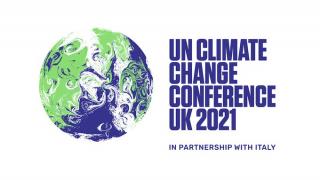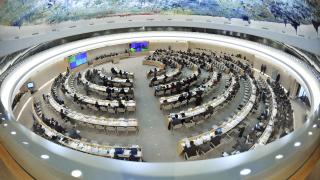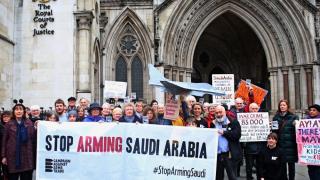On Wednesday 7 March UNA-UK’s Executive Director, Natalie Samarasinghe, appeared as a witness in front of the House of Commons Foreign Affairs Committee to give evidence on the Foreign and Commonwealth Office’s human rights work.
Ms Samarasinghe began by stating that human rights remains one of the most difficult and contentious areas of the UN’s work and that the UN has limited options at its disposal when it comes to enforcement, before explaining that where the UN has made significant progress is on the promotion of rights and the development of normative standards.
“The UN can encourage, support and advise states, and sometimes push, criticise and embarrass them, but when a state does not want to play ball, there is a limited amount of action that the UN—by which I really mean its officials—can take”Responding to a question on the UK’s record, Natalie highlighted positive UK action to open up the Security Council, support the Responsibility to Protect doctrine and promote action on Syria, before using Yemen as an example of where the UK’s conduct has been less positive:
“I think it is fair to say the UK has not been forthcoming in supporting motions at the Human Rights Council to have an independent investigation into what is going on in Yemen. I also should say that the UK, as penholder on Yemen, has not been fulfilling its job. We have seen only one substantive resolution on Yemen in the past year and a handful of statements. I do think there is a mismatch there.” Read UNA-UK’s Head of Campaign’s op ed on UK conduct with respect to address the conflict in Yemen.On the UK’s own engagement with human rights mechanisms:
“there are some instances that are worrying. [the UK] has rejected many, many more of its universal periodic review recommendations than most states. It supports just 42% of the recommendations received. The average for western states is about 67%, and that is a downward trend, so that is a bit concerning….the poor responses to criticism that have come from special rapporteurs are worth mentioning. There have been criticisms and personal attacks on special rapporteurs on housing and violence against women, and on the Committee on the Rights of Persons with Disabilities. I think there was, quite frankly, racist abuse directed against the High Commissioner for Human Rights when he warned about plans to change HR protections in the UK. So, there are some worrying situations that I would like to draw to the Committee’s attention."Responding to a broader question on the UK’s role, Ms Samarasinghe said:
“there is a real case to be made for [the UK’s] vision to be based on principles…We have seen that a number of small states—Sweden, Canada, Netherlands and Liechtenstein—have an outsized influence at the UN, based on what they do. The most important lever at the moment that I see for the UK, funnily enough, is not even at Security Council position but the amount of money that it spends on aid. That is the big factor that so many member states will mention to us about what gives the UK power. There is a very realpolitik and pragmatic reason for the UK to be seen as a progressive player.”Watch a recording of the session or read the transcript.





